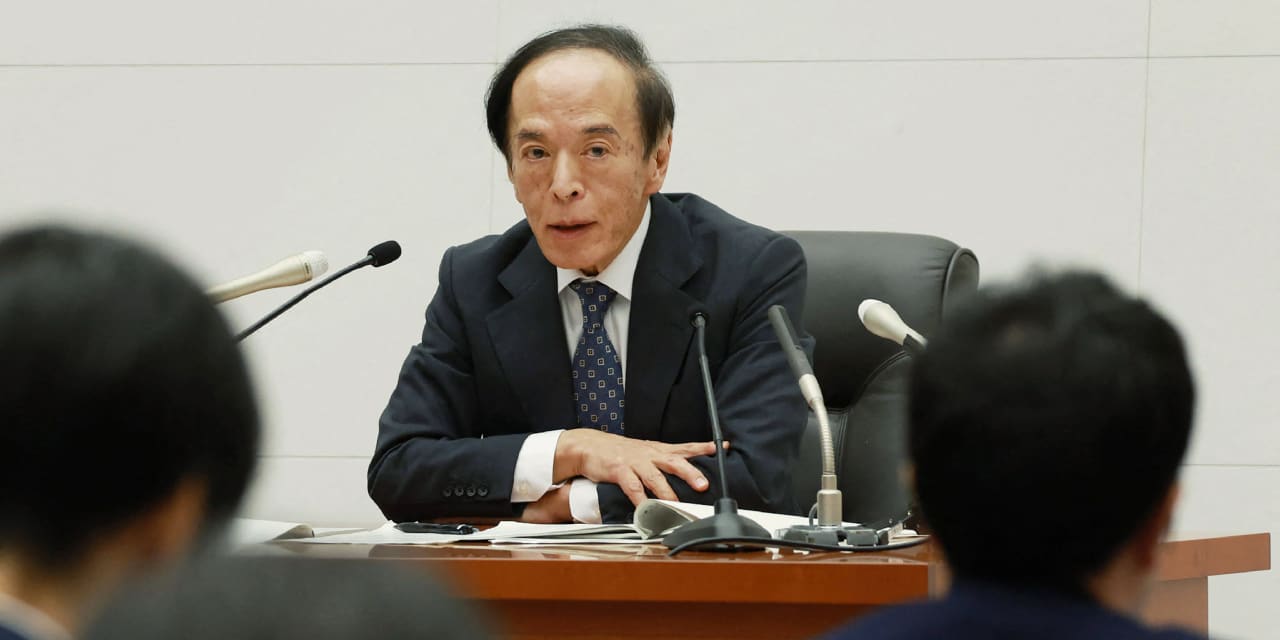Rumors of monetary tightening by the
Bank of Japan
turned out to be exaggerated for now. That’s a good thing for Japanese stocks, up to a point.
Deflationary Japan is seeing unheard-of price rises, with core inflation staying above 3% annually for the past year. BOJ Governor Kazuo Ueda hinted in a press interview three weeks ago that the bank might respond by lifting its -0.1% prime interest rate, sparking a mini-rally in the yen. Then the bank stood pat at a Sept. 21 policy meeting, citing “extremely high uncertainties.” The yen then tumbled anew toward a record low of 150 to the dollar.
That’s the level where the BOJ intervened last fall, and the yen, with a big assist from slumping U.S. Treasury yields, climbed 17% in three months.
This time Ueda and colleagues will wait and see whether workers can wring wage hikes from Japan Inc. at negotiations next spring, predicts Masamichi Adachi, the chief Japan economist at UBS. “They still believe inflation could be temporary,” he says. “The economy is not overheating yet.”
A sagging currency would be negative for equities in most places. But Japan’s market is dominated by exporters like
Toyota Motor
(ticker: 7203.Japan),
Sony Group
(6758.Japan), and industrial equipment giant
Keyence
(6861.Japan), which have feasted as the declining yen met the stronger-than-expected demand in the U.S. and Europe. The
iShares MSCI Japan
exchange-traded fund (EWJ) is up 22% in the past 12 months, outstripping a 16% rise in the S&P 500.
More gains are ahead so long as the U.S. economy keeps chugging along, thinks Daniel Hurley, a portfolio specialist for international equities at
T. Rowe Price.
“Half the revenue for listed Japanese companies comes from outside Japan,” he says. “It’s still set up to be a supported market.”
Japan has hit a macroeconomic sweet spot of sorts, adds Aaron Hurd, the senior currency portfolio manager at State Street Global Advisors. Falling prices for most import commodities, oil excepted, take some of the sting out of a record-low yen. Prime Minister Fumio Kishida’s government is preparing to subsidize consumers’ fuel costs, which it can afford to do by borrowing at less than 1% per annum.
A recession in the U.S. would dampen Japanese exports, but likely spur Federal Reserve rate cuts that would bolster the yen. “The yen could easily be the best-performing currency in the G10 next year, if it goes to 155 to 158 [to the dollar] first,” he says.
Investors are also impressed by Japan’s campaign to make companies more shareholder- and inflation-friendly. The Tokyo Stock Exchange rolled out sanctions earlier this year on companies with market capitalizations that are below their book value. (Toyota itself was in this doghouse before a 50% year-to-date surge.) Kishida is pushing a “new capitalism” program that would hike the minimum wage by 4% and “make it easier for people to work in flexible ways.”
“We actually believe this time is different in Japan,” says Katrina Dudley, a portfolio manager at
Franklin Templeton.
“Our exposure has increased.”
Other market players are, like BOJ Gov. Ueda, waiting for more data before taking any action. “Professional money managers are now being cautious on Japan,” says Cameron Brandt, the chief of research at financial flows monitor EPFR. “People have been burned by false dawns before.”
It’s fair to say that the friendly No. 3 economy is at least nudging in the right direction. With No. 2 China struggling financially and threatening politically, that’s good news.
Read the full article here













Leave a Reply